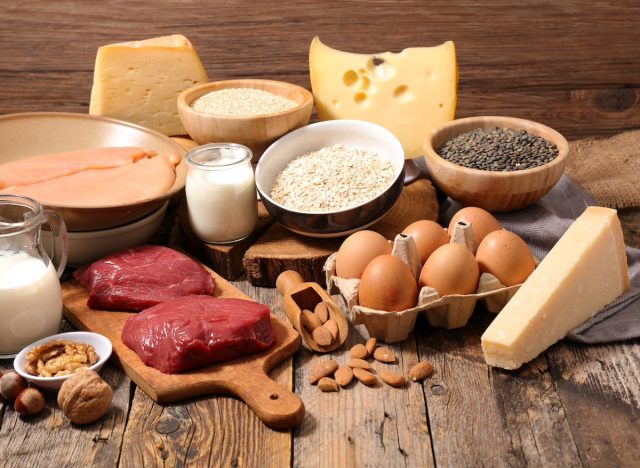The Pros & Cons of a High-Protein Diet for Weight Loss

Many individuals bump up their protein intake while dieting for several reasons. Mostly, a high-protein diet keeps you feeling full long after your meal, which, in turn, can curb your appetite and help you avoid unhealthy cravings. But as with anything, there are both pros and cons when it comes to maintaining a high-protein diet for weight loss.
We spoke with The Nutrition Twins®, Tammy Lakatos Shames, RD, CDN, CFT, and Lyssie Lakatos, RD, CDN, CFT, members of our Medical Expert Board, and are here to share everything you should know about a high-protein diet and whether it’s the right path for you. Continue reading to learn more, and when you’re finished, check out The #1 Best Snack To Buy at Trader Joe’s for Weight Loss.
The pros of a high-protein diet:

1. You’ll feel satisfied.
As mentioned above, one of the best benefits of consuming protein for weight loss is it helps with satiety since it takes longer to digest.
“While carbs digest quickly, generally in one to two hours (and up to four hours, maximum), protein digests in four to six hours, which is great when it comes to weight loss since it staves off hunger and most people consume excess calories when they’re hungry,” The Nutrition Twins explain.
After all, feeling full helps keep you lean!
2. You’ll avoid energy crashes.
Since protein digests slower, it helps stabilize your blood sugar. “[This] is especially helpful if you’re eating even modest amounts of carbohydrates, which can cause quick surges in energy, followed by crashes,” The Nutrition Twins note. The more protein you eat during every meal will help avoid this.
3. Your body will release less cortisol, a hormone that contributes to belly fat.
Research connects cortisol (the stress hormone) to belly fat. By consuming more protein, your body won’t release as much cortisol.
“When blood sugar dips, your body releases cortisol to help raise blood sugar,” The Nutrition Twins tell us. “Cortisol is linked with belly fat and since protein helps to slow digestion and stabilize blood sugar, you won’t be as likely to have blood sugar crashes and the subsequent triggering of cortisol.”
4. Your metabolism will stay high.
Many diets geared toward weight loss don’t provide a sufficient amount of protein to preserve lean muscle while you drop weight. “So, as you lose weight, you also slow your metabolism as calorie-burning muscle tissue is lost,” The Nutrition Twins add. “Since getting adequate protein helps spare the lean muscle tissue loss, you are more likely to also keep your metabolism from slowing.”
5. Your tastebuds may change.
If your main focus is to bump up your protein intake and eat fewer sweets, your tastebuds may change. You might even begin to appreciate foods that aren’t super sweet.
“On average, your tastebuds are replaced with new ones every two weeks, so if you reintroduce sweet foods after you haven’t been eating sweet foods for a couple of weeks, you will have a new appreciation for foods that aren’t as sweet, including healthier natural sweets, like fruit,” The Nutrition Twins say.
The cons of a high-protein diet:

1. You may consume more calories than your body needs.
If you mainly opt for fatty protein sources such as processed meats and full-fat dairy, you may end up consuming more calories than your body needs to lose weight.
“What’s more, these foods are high in salt so they cause you to bloat and retain fluid weight—and most of them are inflammatory, making weight loss more challenging,” The Nutrition Twins add.
2. You may get constipated and experience weight gain.
High-protein diets usually don’t feature many veggies, fruits, and whole grains, which means they’re low in fiber. Fiber is key, as it adds bulk to your stool and helps you stay “regular.”
“Clearly, if you can’t go to the bathroom, the scale goes up from the stool in the intestines,” The Nutrition Twins tell us. “Not only do most people not want to be active and burn calories when they’re constipated, but when they see the weight gain on the scale, even though it’s not body fat, they get discouraged and are more likely to go off the diet.”
3. You may find weight loss to be more challenging.
When weight loss is the goal, consuming fresh fruits, veggies, and whole grains is crucial. They provide essential antioxidants and anti-inflammatory compounds to help you avoid inflammation. Without them, you’re not reaping these benefits.
“As inflammation in the body escalates, it makes it harder to lose weight and easier to pack on the pounds,” The Nutrition twins say.





